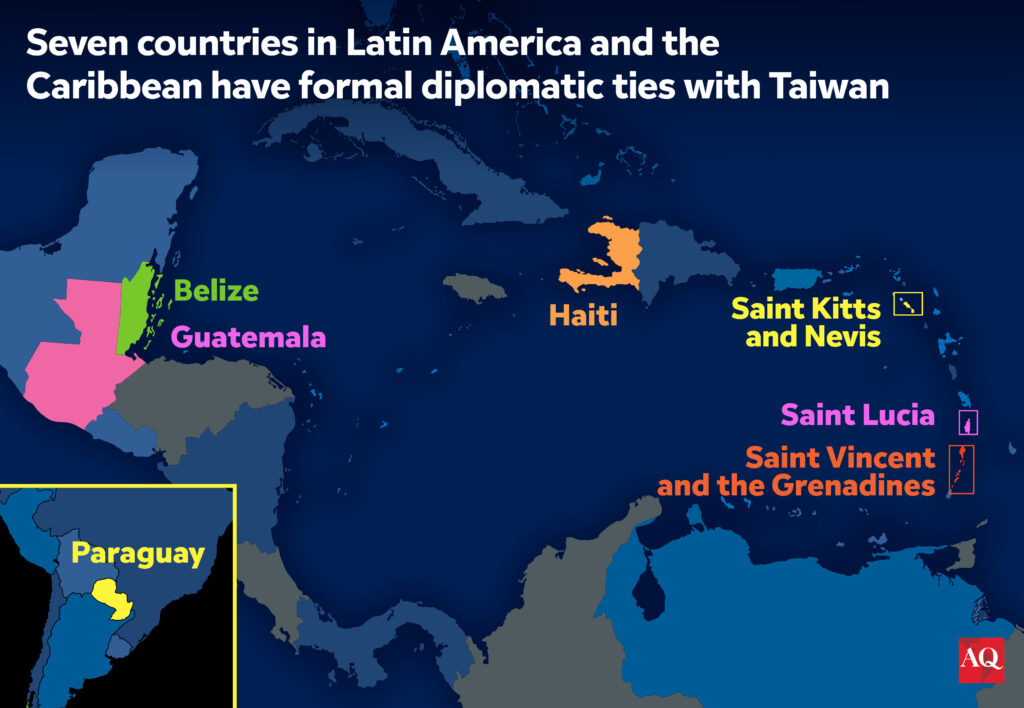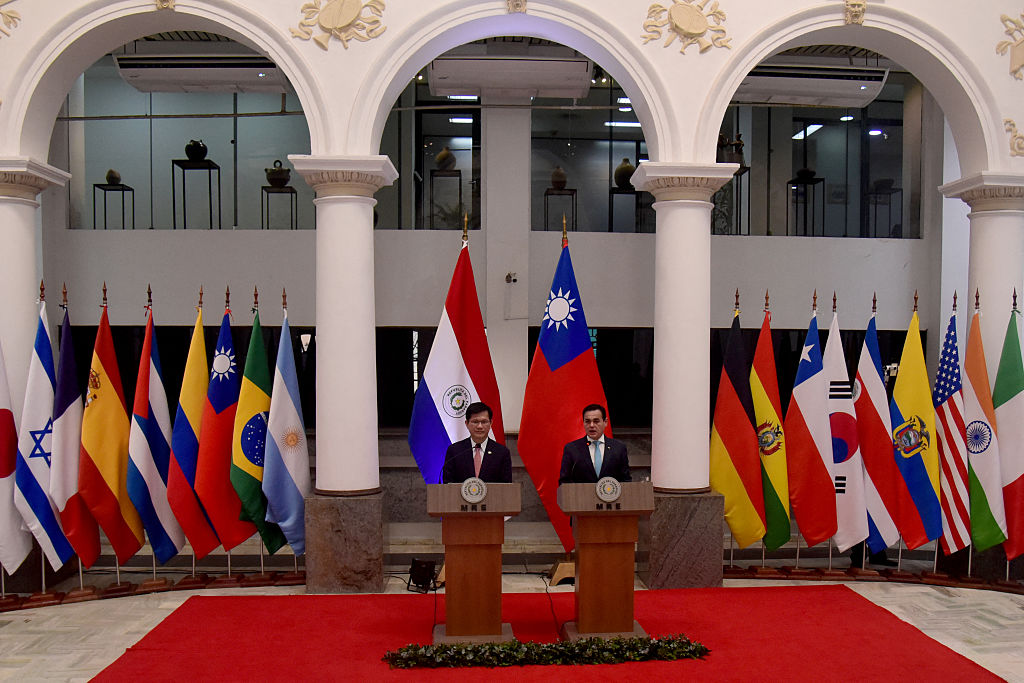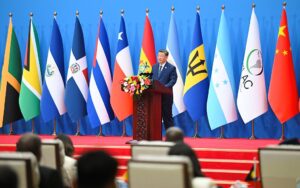Taiwan’s engagement in the Americas only makes headlines when another diplomatic ally falls. Analysts don’t always pay attention to what happens in the interim, including the meaningful efforts the country makes to shore up its diplomatic partnerships while China continues to court Taiwan’s seven remaining allies in the region.
Taiwan has formal diplomatic ties with Belize, Guatemala, Haiti, Paraguay, Saint Kitts and Nevis, Saint Lucia, and Saint Vincent and the Grenadines. The Asian nation’s willingness to maintain these relations has been tested recently, making Taipei’s efforts to remain relevant in the Western Hemisphere even more urgent.
Last month, for example, Taiwan’s Ministry of Foreign Affairs announced that it would increase its foreign aid to the region by roughly $32 million in 2026. Taiwan is also active on the ground, helping its LAC allies address challenges ranging from public safety to governance. Its partnerships across the region show an island nation quietly reinforcing its alliances in the face of growing Chinese influence, which is set to intensify during election season as Beijing seeks to sway allegiances.
Taiwan is continuing to prove itself as the partner of choice for several countries in the hemisphere through various programs that help its partners address security and development challenges. These efforts help Taiwan strengthen existing ties—and the country could even win back allies or gain new partners, bolstering its international legitimacy.
Taiwan’s LAC activity
Guatemalan President Bernardo Arévalo visited Taipei in June, publicly reaffirming ties and reiterating support for Taiwan’s WHO observer push. Both sides pledged further cooperation in areas such as public health, education, agriculture, technology and infrastructure. As usual, the Chinese government denounced Guatemala’s relations with Taiwan and urged it to make the “right decision soon.” Taiwan’s International Cooperation and Development Fund (ICDF) also has an ongoing portfolio in Guatemala around health training, disaster early warning, and maternal-neonatal care, and the Taiwanese embassy recently delivered 990 tons of rice to support local communities.

Last year, Taiwan and Belize announced a raft of trade agreements to celebrate the 35th
anniversary of their diplomatic relations. The ICDF has just concluded its decade-long sheep and goat breeding program, and chronic disease prevention and broadband projects are ongoing. Prime Minister John Briceño and his party recently won re-election for another five-year term, and there have been no significant reports of Chinese coercion, suggesting that Belize will remain a strong Taiwan ally for the foreseeable future.
Taiwan is also bolstering ties with Haiti ahead of the 70th anniversary of their bilateral relationship in 2026. President Lai received Haiti’s Foreign Minister Jean-Baptiste in July, reiterating their partnership in public security, education and infrastructure. Despite Haiti’s dire ongoing security crisis, the ICDF continues to implement food security initiatives. Although Haiti sent a representative to the China-CELAC Summit in Beijing back in May, the Haitian government insists it notified Taiwan of its participation, highlighting the delicate balancing act in its foreign policy.
In Saint Kitts and Nevis (SKN), the government is currently undergoing a comprehensive reform of its Citizenship by Investment (CBI) program. This is due in part to a scandal involving a real estate company managed by a Chinese national who allegedly offered discounted CBI to other Chinese nationals illegally and provided kickbacks to the former head of the SKN CBI program. This year, the ICDF helped upgrade SKN’s digital identity and civil registry program, and rolled out a mental health services project.
Saint Lucia’s Deputy Prime Minister led a delegation to Taiwan in September. President Lai highlighted the launch of the Taiwan Global Pathfinders Initiative, where youth from Taiwan and its diplomatic allies will engage in international exchange and internships. The ICDF is carrying out projects in community business revitalization, chronic disease prevention capacity building, and an e-commerce platform. Notably, the Saint Lucia Labour Party, to which current Prime Minister Phillip Pierre belongs, also sent representatives to the China-CELAC Forum in Beijing in May. Saint Lucia has begun preparation for its general election, which is expected to take place next year. We may see an increase in Chinese influence campaigns as the election season intensifies.
Taiwan is assisting Saint Vincent and the Grenadines (SVG) in addressing the country’s surge in crime, recently rolling out an AI-enabled public safety project, which includes 300 surveillance cameras, command-center upgrades, and training for the local police. This program appears to be Taiwan’s version of China’s Safe City program and Global Security Initiative, offering its own democratic approach to public security solutions. Taiwan’s projects illustrate its willingness to strengthen local institutions ahead of the general election in November. Prime Minister Ralph Gonsalves has publicly accused China of backing the opposition to flip SVG to Beijing if his party loses.
In Paraguay, the ICDF launched a countrywide health information system, covering about 1,000 public healthcare facilities, and supported an initiative to strengthen local entrepreneurs’ proficiency in 3D textile technology, shortening production timelines and facilitating their entry into global markets.
In response, China is attempting to pressure Paraguay. A recent undercover documentary from Al Jazeera detailed how an alleged Chinese criminal has been working with a network of Chinese Communist Party collaborators and meeting with the Chinese embassy and a consulate in Brazil to strategize about how to flip Paraguay. Last year, Chinese diplomat Xu Wei visited Paraguay, ostensibly to attend a UNESCO event. He addressed Paraguay’s legislative assembly, urging lawmakers to sever ties with Taiwan. Paraguay declared him persona non grata and expelled him from the country.
Local beef and soy farmers continue to advocate for a diplomatic switch so that they can export directly to the Chinese market. China has stated explicitly in its action plan for the region that it intends to bring 300 politicians from the Community of Latin American and Caribbean States (CELAC) to Beijing each year for the next three years. Expect pro-China Paraguayan legislators to be among those courted by Beijing soon.
Election pressure
As Beijing tests its levers, from trade access to political courting and even alleged criminal networks, Taiwan’s relations with each of its allies appear stable—for now. However, China’s influence activities tend to ramp up near election cycles, so Taiwan watchers should keep an eye on the elections in SVG in November, Saint Lucia next year, possibly Saint Kitts and Nevis in 2027, Guatemala in 2027, and Paraguay in 2028.
Each diplomatic ally Taiwan loses in this region and around the world further erodes its global legitimacy and emboldens China to retake Taiwan by any means necessary—even by force. And each new ally China gains gives Beijing the chance to challenge U.S. national interests in the Western Hemisphere.
Taiwan-friendly governments and partners in the hemisphere must remain vigilant, identify China’s influence playbook, and call it out when they see it. But more importantly, Taiwan should fight the narrative that it’s only a matter of time before China steals all its allies.
Saint Lucia, for example, flipped to China in 1997, then flipped back to Taiwan in 2007 after the United Workers Party—which was pro-Taiwan—regained power. The upcoming election in Honduras next month, in which one presidential candidate has promised to re-establish relations with the island nation, may be another chance for Taiwan to turn back the diplomatic tide.







